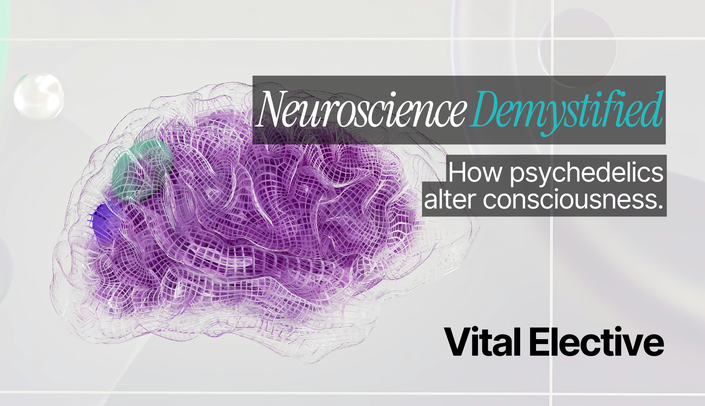
Psychedelic Neuroscience Demystified - Vital Elective
Practical Psychedelic Neuroscience for Facilitation and Integration
Date: 7, 14, 21, 28 August
Time: 2pm - 3.30pm EST
Instructors: Melanie Pincus, PhD and Manesh Girn, PhD Candidate
In this course, Melanie Pincus (PhD, Neuroscience) and Manesh Girn (PhD Candidate, Neuroscience) will provide an overview of psychedelic neuroscience, with an emphasis on practical applications and therapeutic mechanisms. We will provide a recap of the pharmacological mechanisms of action of classic psychedelics, MDMA, and ketamine, and also dive into their anti-inflammatory and neuroplasticity-boosting effects. We’ll cover how neuroplasticity is altered in certain mental health conditions and discuss how psychedelics can potentially counter these effects via their ability to be ‘psychoplastogens’ at a cellular level. This will be followed by a discussion of psychedelics’ ability to promote psychological flexibility, and how this flexibility, as well as underlying boosts in neuroplasticity, can be best leveraged for lasting change. We’ll end by discussing the primary neurobiological and psychological factors that influence one’s sensitivity to psychedelics, and will also touch on recent clinical trials and research on microdosing.
Learning Objectives
- Have a general understanding of the neuropharmacology of the classic psychedelics and the ‘quasi-psychedelics’ MDMA and ketamine
- Understand how the anti-inflammatory effects of classic psychedelics may contribute to their therapeutic effects
- Understand how neuroplasticity is altered in mood disorders and how psychedelics can counter these changes
- Understand how psychedelics boost psychological flexibility
- Understand the Relaxed Beliefs Under psychedelics (REBUS) model of psychedelic effects and how to use this framework to guide one’s approach to integration
- Know the factors that contribute to an individual’s sensitivity to psychedelic effects
- Have a sense of the findings from a recent trial comparing psilocybin to the SSRI antidepressant drug, escitalopram
- Know the current state of scientific research on microdosing
Your Instructors

Melanie Blair Pincus, Ph.D., is a neuroscientist, inventor, and artist who researches and designs transformative experiences that enhance emotional resilience and cognitive plasticity. Melanie received her B.S. from Stanford University, her Ph.D. in Neuroscience from Emory University, and is an Adjunct Assistant Professor at Columbia University. In her doctoral work, she studied the legacy of early life trauma and stress on emotion regulation circuits in the brain, spurring an interest in the types of experiences that can build resiliency and rewire the brain. She is now an independent researcher studying how psychedelics and non-ordinary states of consciousness impact the brain and promote neuroplasticity. Melanie also teaches a course at Columbia University on how childhood play shapes the brain and promotes socio-emotional development. Melanie designs play-based installations that blend the educative power of play with biosensing technology to cultivate emotion regulation, connectedness, and complex cognitive skills in children and adults alike.

Manesh Girn, Ph.Dc
Manesh is a Ph.D. candidate in Neuroscience at McGill University and has been lead or co-author on over a dozen scientific publications and book chapters on topics including psychedelics, meditation, mind-wandering, and the default-mode network. His PhD dissertation focuses on the default-mode network and he is also conducting research on the brain mechanisms underlying LSD, psilocybin, and DMT in collaboration with Dr. Robin Carhart-Harris and others from the Imperial College London Center for Psychedelic Research. In his free time, he also runs a YouTube channel, The Psychedelic Scientist, where he discusses the latest findings in psychedelic science in an easy to understand, but non-superficial form.
